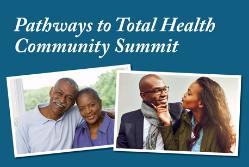October 11, 2016
Prevention and Early Detection of Prostate, Colorectal Cancers are Topics of Pathways to Total Health Community Summit

(BROOKLYN, N.Y. – Oct. 12, 2016) SUNY Empire State College, with the support of SUNY Downstate Medical Center's Brooklyn Health Disparities Center, is sponsoring the Pathways to Total Health Community Summit.
The summit takes place from 8 a.m. to 4:30 p.m., Friday, Oct. 14, at SUNY Downstate’s Basic Science Building, 395 Lenox Road, Brooklyn, N.Y.
The summit, which is open to the public and free of charge, provides the opportunity for members of Brooklyn’s diverse communities to learn from medical experts about how prostate and colorectal cancers are detected and treated.
Those interested in attending are requested to register in advance.
“Prostate and colorectal cancers are urgent issues in the black community,” said Daramola N. Cabral, chair of the summit and an assistant professor of health sciences with SUNY Empire’s Community and Human Services and Science Math and Technology areas of study. “By raising awareness and providing specific information, we hope to help many more members of our communities to engage the actions that prevent and detect these deadly diseases. Colorectal cancer is one of the few cancers that is preventable through the use of screening. While the statistical data are alarming, early detection of prostate cancer, together with timely treatment, can lead to improvements in outcomes for patients.”
Cabral earned her doctorate in Public Health, with an emphasis in epidemiology, and a Master of Public Health in Maternal and Child Health, both from the University of California, Berkeley.
About Prostate and Colorectal Cancers
In 2015 alone, the American Cancer Society estimated that 93,000 cases of colon cancer and approximately 40,000 cases of rectal cancer were diagnosed and nearly 50,000 deaths were attributed to these diseases.
African-Americans have the highest colorectal incidence and mortality rates in the country, according to the U.S. Department of Health and Human Services, but, according to the 2014 Behavioral Risk Factor Surveillance System data, only 68 percent of African-Americans in New York are up-to-date on colorectal cancer screening.
An estimated 220,800 new cases of prostate cancer occurred in the U.S. during 2015 and it is the most frequently diagnosed cancer in men other than skin cancer, according to the American Cancer Society.
The cause of nearly 28,000 deaths in 2015, prostate cancer is the second-leading cause of cancer death in men and, for reasons that remain unclear, incidence rates are about 60 percent higher in black Americans than non-Hispanic white Americans, according to the American Cancer Society.
According to the American Cancer Society, although prostate cancer death rates have been decreasing since the early 1990s in men of all races and ethnicities, the rate remains more than twice as high for black Americans, placing them at greater risk.
About the Pathways to Total Health Community Summit
The summit features discussion/breakout sessions, door prizes and giveaways and attendees will be provided with lunch and snacks.
Dr. Robin Roberts, director of the University of the West Indies’ School of Clinical Medicine and Research, is the summit’s morning keynote speaker.
As its director, Roberts manages the school's academic program and operations.
He also is a consulting urologist at Princess Margaret Hospital, in the Bahamas, and one of the founding members of the UWI Clinical Training program.
Camille Ragin, an associate professor with Temple Health’s Cancer Prevention and Control Program at Fox Chase Cancer Center, Philadelphia, Pa., keynotes the afternoon summit sessions.
Ragin holds a doctorate in Infectious Diseases and Microbiology and a Master of Public Health in Epidemiology, both of which she earned at the University of Pittsburgh. Her research focuses on the molecular epidemiology of cancer in the African diaspora.
Temple Health refers to the education and research activities carried out by the affiliates of Temple University Health System and the Lewis Katz School of Medicine at Temple University.
About SUNY Empire State College
Empire State College, the nontraditional, open college of the SUNY system, educates nearly 19,000 students worldwide at eight international sites, more than 35 locations in the state of New York, online, as well as face to face and through a blend of both, at the associate, bachelor’s and master’s levels.
The average age of an undergraduate student at the college is 35 and graduate students’ average age is 40.
Most Empire State College students are working adults. Many are raising families and meeting civic commitments in the communities where they live, while studying part time.
In addition to awarding credit for prior college-level learning, the college pairs each undergraduate student with a faculty mentor who supports that student throughout his or her college career.
Working with their mentors, students design an individual degree program and engage in guided independent study and coursework on site, online or through a combination of both, which provides the flexibility for students to choose where, when and how to learn.
Students have the opportunity to enroll five times during the year.
The college’s 78,000 alumni are active in their communities as entrepreneurs, politicians, business professionals, artists, nonprofit agency employees, teachers, veterans and active military, union members and more.
The college was first established in 1971 by the SUNY Board of Trustees with the encouragement of the late Ernest L. Boyer, chancellor of the SUNY system from 1970 to 1977. Boyer also served as United States commissioner of education during the administration of President Jimmy Carter and then as president of the Carnegie Foundation for the Advancement of Teaching.
More information about the college is available at www.esc.edu.
###
Media contact: David Henahan, director of communications, SUNY Empire State College
David.Henahan@esc.edu
518-587-2100, ext. 2918
518-321-7038, cell
